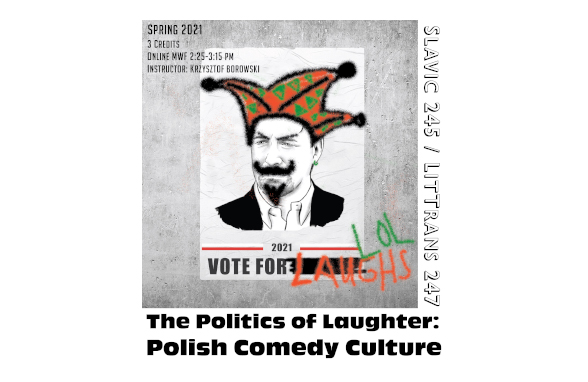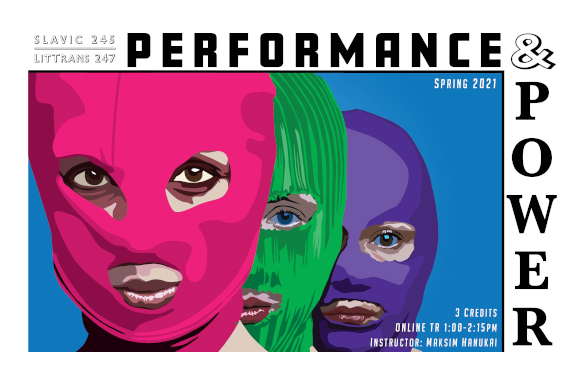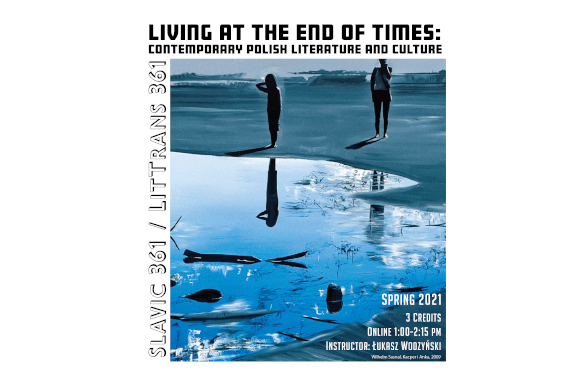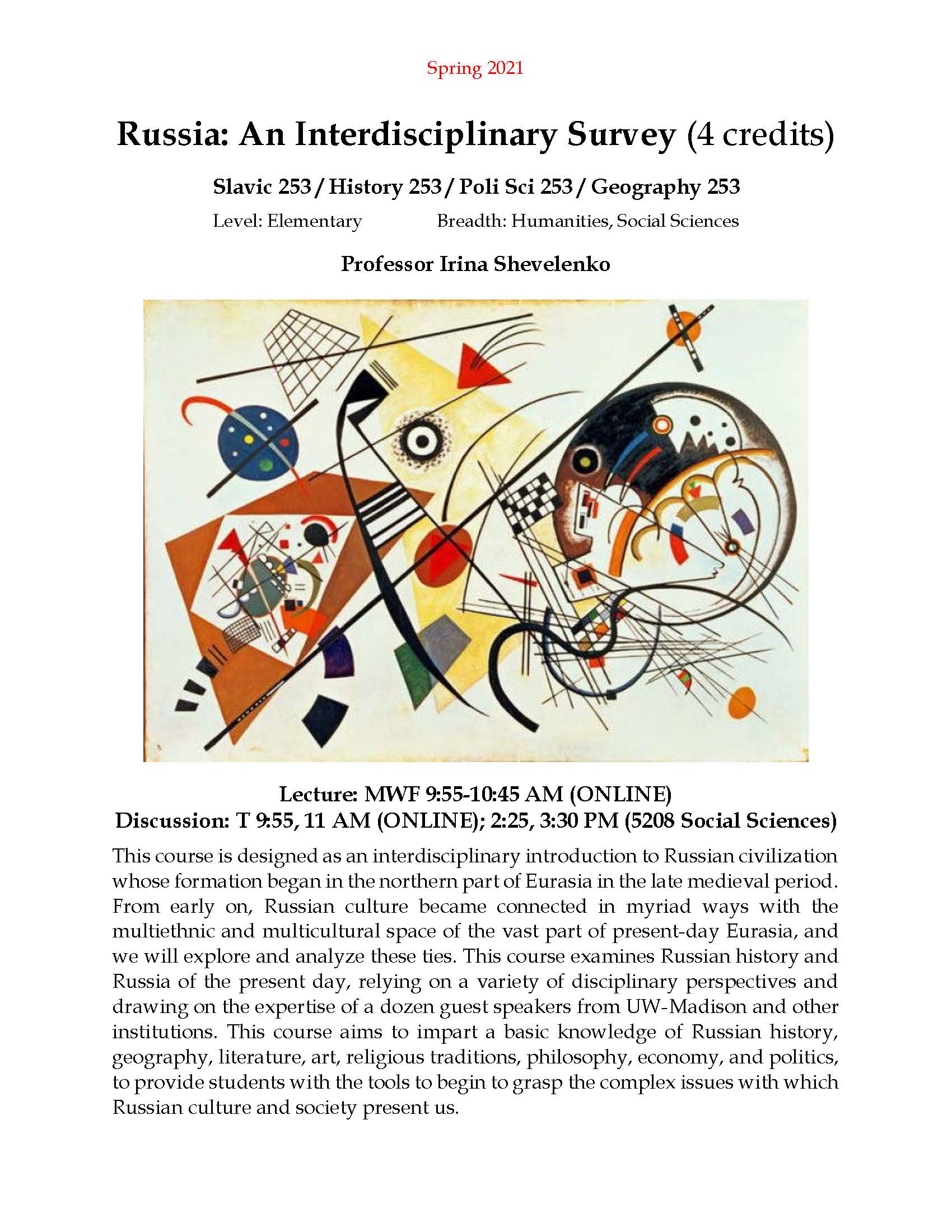This is an accordion element with a series of buttons that open and close related content panels.
SLAVIC 102 – Second Semester Russian
(4 credits)
- Section 001: ONLINE (MTWRF 9:55-10:45 am)
- Section 002: ONLINE (MTWRF 12:05-12:55 pm)
- Section 003: ONLINE (MTWRF 1:20-2:10 pm)
Course Description: Continuation of SLAVIC 101.
Prerequisites: SLAVIC 101 or equivalent. Open to first-year students.
SLAVIC 112 – Second Semester Polish
(4 credits)
- ONLINE (MTWR 11:00-11:50 am) Instructor: Krzysztof Borowski
Prerequisites: SLAVIC 111. Open to first-year students.
SLAVIC 116 – Second Semester Czech
(4 credits)
- ONLINE (MTWR 12:05-12:55 pm) Instructor: David Danaher
Course Description: The course is designed to develop communicative skills in Czech: speaking, reading, listening, and writing. It is thematically organized based on units 4-8 in the online, open-source textbook Reality Czech, and our Canvas site is keyed to materials and activities in this textbook. By the end of the course, students should be able to: (1) hold conversations in Czech that reflect comfort with the communicative themes that we have treated; (2) understand and write texts on these themes by applying what they have learned; (3) demonstrate familiarity with aspects of Czech culture relating to these themes. An optional, extra-credit project for students in this course is a scene-by-scene analysis of the film Dark-Blue World: please see materials for this project on Canvas where there is also a link to live-stream the film.
Prerequisites: SLAVIC 115 or equivalent.
SLAVIC 204 – Fourth Semester Russian
(4 credits)
- MTWRF 9:55-10:45 am
- ONLINE (MTWRF 1:20-2:10 pm)
Course Description: Continuation of SLAVIC 203.
Prerequisites: SLAVIC 203 or equivalent. Open to first-year students.
SLAVIC 245 – Literature and Revolution
(3 credits)
- ONLINE (TR 11:00-12:15 pm) Instructor: Maksim Hanukai
Course Description: In this course we will take a literary journey from St. Petersburg to Moscow, following the shifting cultural and political currents in Russia from the years preceding the 1917 Revolution to the rise of Stalinism in the 1930s. Topics will include: revolutionary violence and terror, civil war and emigration, Futurism and the birth of Russian avant-garde art, Soviet feminism and the engineering of the “New Man,” technological utopias and totalitarian dystopias, literature and early Soviet economic policy. We will supplement our readings of literature with material from other media—e.g. the visual arts, architecture, film, theater—reflecting on the Revolution’s challenge to traditional norms and boundaries. Among the questions we shall reflect on will be: How did Russian writers and artists respond to the energies unleashed by the Revolution? How did perceptions of the Revolution change over time? What are the legacies of the Russian Revolution? How can reading revolutionary literature help us navigate our own highly unstable times?
Prerequisites: None
SLAVIC 245 – Performance And Power
(3 credits)
- ONLINE (TR 1:00-2:15 pm) Instructor: Maksim Hanukai
Course Description: What does it mean “to perform” and what does performance do? How can performance be harnessed to challenge or assert modern structures of power? In this course, we will attempt to answer these and related questions by examining a range of performance theories and practices from Russia, Europe, and the United States. Focusing on the work of artists and authors like Nikolai Evreinov, Bertold Brecht, Marina Abramovic, Pussy Riot, Moisés Kaufman and Sergei Loznitsa, we will learn about political theater in the 20th and 21st centuries, the emergence and evolution of performance art and art actionism, the aesthetic and juridical functions of documentary film and theater, and the recent performative turn in New Left poetry. We will also extend our inquiry beyond the artistic sphere to examine performative practices in modern political and everyday life—including show trials, historical reenactment festivals, geopolitical trolling and disinformation campaigns, and collective memory rituals. This course is open to students at all levels. All readings and materials will be available in English.
Prerequisites: None
SLAVIC 245 – Politics and Comedy in Poland
(3 credits)
- ONLINE (MWF 2:25-3:15 pm) Instructor: Krzysztof Borowski
Course Description: What makes comedy a powerful political tool? Can laughter become a weapon against totalitarian regimes? How do comedy and humor help subvert power relations in society? We explore these and similar questions by analyzing political comedy in various formats (film, television, literature, music, internet memes, etc.) using examples from modern Polish culture. Due to its strong tradition of political comedy amidst a turbulent history – wars, communism, totalitarian rule, and social protests – Poland is uniquely positioned to serve as a cultural case study of how individuals and societies can embrace and survive change, political turmoil, and an uncertain future. This course is open to students at all levels. All reading and materials will be available in English.
Prerequisites: None
SLAVIC 253 – Russia: An Interdisciplinary Survey
(4 credits)
- ONLINE (MWF 9:55-10:45 am) Instructor: Irina Shevelenko
- DIS 301: ONLINE (T 9:55-10:45 am)
- DIS 302: ONLINE (T 11:00-11:50 am)
- DIS 303: T 2:25-3:15 pm
- DIS 304: T 3:30-4:20 pm
Course Description: This course is designed as an interdisciplinary introduction to Russian civilization whose formation began in the northern part of Eurasia in the late medieval period. From early on, Russian culture became connected in myriad ways with the multiethnic and multicultural space of the vast part of present-day Eurasia, and we will explore and analyze these ties. This course examines Russian history and Russia of the present day, relying on a variety of disciplinary perspectives and drawing on the expertise of a dozen guest speakers from UW-Madison and other institutions. This course aims to impart a basic knowledge of Russian history, geography, literature, art, religious traditions, philosophy, economy, and politics, to provide students with the tools to begin to grasp the complex issues with which Russian culture and society present us.
Prerequisites: None
SLAVIC 276 – Third Year Russian II
(3 credits)
- MWF 9:55-10:45 am Instructor: Alexandra Walter
- ONLINE (MWF 1:20-2:10 pm) Instructor: S. A. Karpukhin
Course Description: A thorough review of several major aspects of Russian grammar, focusing on the use of complex syntax in speech and writing. Read and discuss literary works and other Russian-language texts. Develop writing proficiency through compositions on a variety of topics.
Prerequisites: SLAVIC 275.
SLAVIC 277 – Third Year Polish I
(3 credits)
- MWF 12:05-12:55 pm Instructor: Krzysztof Borowski
Course Description: Review of Polish grammar. Reading, oral practice, and composition.
Prerequisites: SLAVIC 208 or consent of instructor. Open to first-year students.
SLAVIC 278 – Third Year Polish II
(3 credits)
- MWF 12:05-12:55 pm Instructor: Krzysztof Borowski
Course Description: Review of Polish grammar. Reading, oral practice, and composition.
Prerequisites: SLAVIC 208.
SLAVIC 306 – Sixth Semester Intensive Polish
(3 credits)
- MWF 12:05-12:55 pm Instructor: Krzysztof Borowski
Course Description: Continuation of 305. Reading selections from twentieth century Polish literature. Focus on intensive writing.
Prerequisites: SLAVIC 305. Graduate standing or consent of instructor.
SLAVIC 316 – Russian Language And Culture II
(3 credits)
- ONLINE (TR 1:00-2:15 pm) Instructor: Anna Tumarkin
Course Description: Emphasizes speaking and listening skills, helping students to converse on different stylistic levels, with varying degrees of formality, according to the rules of Russian speech etiquette.
Prerequisites: SLAVIC 275.
SLAVIC 331 – Fourth Year Polish I
(3 credits)
- MWF 12:05-12:55 pm Instructor: Krzysztof Borowski
Course Description: Extensive reading, discussion, composition, and grammar review.
Prerequisites: SLAVIC 278 or consent of instructor. Open to first-year students.
SLAVIC 331 – Fourth Year Polish II
(3 credits)
- MWF 12:05-12:55 pm Instructor: Krzysztof Borowski
Course Description: Extensive reading, discussion, composition, and grammar review.
Prerequisites: SLAVIC 331.
SLAVIC 352 – Second Semester Intensive Czech
(3 credits)
- ONLINE (MTWR 12:05-12:55 pm) Instructor: David Danaher
Course Description: The course is designed to develop communicative skills in Czech: speaking, reading, listening, and writing. It is thematically organized based on units 4-8 in the online textbook Reality Czech, and our Canvas site is keyed to materials and activities in this textbook. By the end of the course, students should be able to: (1) hold conversations in Czech that reflect comfort with the communicative themes that we have treated; (2) understand and write texts on these themes by applying what they have learned; (3) demonstrate familiarity with aspects of Czech culture relating to these themes. 352 is the intensive section of 116 and is reserved for students who have prior experience in Czech or advanced knowledge of another Slavic language (Russian, Slovak, Polish, etc.). By completing extra work as indicated in the supplemental syllabus, students will also: (4) continue to develop a broad receptive acquaintance with the foundations of Czech grammar as well as (5) further their facility to read in Czech by working through assigned texts. Students in 352 will also be required to complete scene-by-scene analysis of the film Dark-Blue World: please see materials for this project on Canvas where there is also a link to live-stream the film.
Prerequisites: SLAVIC 351. Graduate standing or consent of instructor.
SLAVIC 361 – Living At The End Of Times: Contemporary Polish Literature And Culture
(3 credits)
- ONLINE (TR 1:00-2:15 pm) Instructor: Łukasz Wodzyński
Course Description: 1989 was a watershed year in modern Polish history. The collapse of communism and the posthumous triumph of the Solidarity movement started a new era in Polish culture. As a democratic, capitalist state, a member of NATO and EU, Poland can finally define itself as a nation without having to fear for its geopolitical existence. However, this fantasy of living in a “posthistory” was short-lived. It soon became evident that no genuine attempt at building a new cultural identity is possible without facing the traumas of the past, from the tragedies of World War II to the grim legacy of People’s Republic of Poland (PRL). Contemporary Polish culture struggles with its historical heritage even as it attempts to “move on.” In this class, we examine the forms of this struggle. What is the role of social of culture in a free society? How does culture mediate our relationship with the past? How does it help us understand the present?
Prerequisites: LITTRANS 215.
SLAVIC 434 – Contemporary Russian Culture
(3 credits)
- ONLINE (MWF 12:05-12:55 pm) Instructor: S. A. Karpukhin
Course Description: Second in a two-semester course sequence, this course focuses on those topics in modern Russian cultural history that are most often discussed by Russians and serve as the basis for contemporary political and media discourse.
Prerequisites: SLAVIC 322 or consent of instructor.
SLAVIC 465 – Advanced Readings In Russian Literature & Culture
(3 credits)
- ONLINE (MWF 11:00-11:50 am) Instructor: S. A. Karpukhin
Course Description: A focus on development of reading, writing, and speaking skills and on the interpretation of texts in their historical and cultural context.
Prerequisites: SLAVIC 321.
SLAVIC 555 – Advanced Russian Listening & Speaking
(3 credits)
- MWF 9:55-10:45 am Instructor: Karen Evans-Romaine
Course Description:The goals of this advanced-level course are to improve students’ Russian proficiency in listening and speaking, with an emphasis on formal registers, and to help provide students with basic knowledge of a variety of areas related to contemporary Russian-language media and culture necessary for a professional-level command of the language, regardless of the student’s discipline. Course units will include recent Russian history (since perestroika), elections, issues of press and mass communications, Russian domestic politics and foreign policy, economic issues in Russia and Kazakhstan, and issues in contemporary Russian culture. We will also discuss some American political and economic issues as reflected in Russian-language media.
Prerequisites: SLAVIC 322.
SLAVIC 708 – Foundation In Russian Modernism (1890's-1930's)
(3 credits)
- ONLINE (MF 1:15-2:30 pm) Instructor: Andrew Reynolds
Course Description: This course introduces students to various trends in Russian Modernist literature, from the twilight of realism (Chekhov) and the birth of Symbolism in the 1890s through the 1930s. We will examine the aesthetic theories and creative practices of major representatives of various trends within Russian experimental literature during the earlier part of the 20th century. Students will acquire a solid foundation in the historical and philosophical groundings of the Russian Modernist imagination, will read a range of secondary sources addressing various aspects of the literary legacy of Russian Modernism, and will develop skills in textual analysis and interpretation. This course is lecture-based and reading intensive. It prepares Slavic graduate students to take a written prelim in Russian Modernism.
Prerequisites: Graduate or professional standing.
SLAVIC 800 – Proseminar-Slavic Literature And Culture
(1 credit)
- W 1:00-2:15 pm Instructor: Irina Schevelenko
Course Description: The purpose of this course is three-fold: an introduction to the faculty in our department, an introduction to the Slavic field in general, and an introduction to research methods in Slavic.
Prerequisites: Graduate or professional standing.
SLAVIC 820 – College Teaching Of Russian
(1 credit)
- R 2:30-4:00 pm Instructor: Anna Tumarkin
Course Description: This course is designed and required for current Slavic Department Russian-language Teaching Assistants and provides important professional development in course design, lesson planning, and assessment. Course participants work cooperatively to develop course activities and assessment instruments, and will learn how to identify and solve problems in the classroom.
Prerequisites: Teaching assistant in Russian. Graduate or professional standing.
SLAVIC 900 – Modernism And Time
(3 credit)
- T 2:30-5:00 pm Instructor: Łukasz Wodzyński
Course Description: Advanced level graduate seminar on topics related to Slavic literature and culture.
Prerequisites: Graduate or professional standing.




